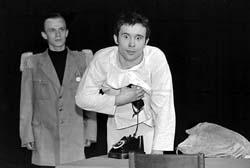Distant Heroes

A festival recently ended in Kyiv after showing provincial talent at the capital’s art galleries, clubs, and drama studios for several days. In fact, provincial talent was the key intrigue for the devotees of actual art. Its mastery, original ideas and techniques were, of course, a challenger to the capital.
Actually, I would like to concentrate on such convincing regional challenges.
The first thing that met the eye was the obvious numerical supremacy of the visual arts. Video artists, provincial photographers and painters, had apparently received the carte blanche. For example, the Objective Unconscious photo exhibit at the Gelman Gallery actually matched similar expositions regularly held at Kyiv’s fashionable galleries. A joint project (Kabul Group) of three photographers cooperating with the Dnipropetrovsk’s NASH magazine embellished the L- Gallery on Andriyivsky uzviz with abundant and strongly attractive naked flesh, as well as a cheerful world outlook, in particular, live creative messages free from the somewhat boring computer effects.
Video art was richly represented and quite diversified (including a separate display from Odesa along with the retrospective Kyiv Dream Trap and KIMAF video festivals). Without doubt, Hennady Chernomashentsev’s video film Soap Dish was a true discovery. The fifteen minute black and white tape is a portrait of a somewhat eccentric man wandering through the city and telling all kinds of stories. It was marked by strange confessions marked by special humor making the film reminiscent of the dadaists and other gifted foundation throwers. All in all nothing seems to happen. There is no plot, yet the hero (Volodymyr Chmutov) is glaringly outside the ordinary reality around him. He can talk about love of the circus at the state cemetery or happily announce that he cannot paint. He is convinced that he “simply must be happy.” And his soap dish photo camera is his only means of establishing contact with the surrounding world. As a result, he seems to aim his camera at all of us, taking quick snapshots, and we become images in his pictures while remaining onlookers. So whose reality is the actual one?
The reality of the theater, in turn, implies a different conventionality. Here, too, groups outside Kyiv were predominant. The one-man play, The Performer (text by Patrick Suskind), starring “cultural hero” Mykola Melnyk of Dnipropetrovsk, deserves separate notice. It is a theater of actor’s expressiveness, at times going too far yet having a steady circle of devotees. An altogether different drama school is represented by the Les Kurbas Theater of Lviv. Their Marko the Damned and Oriental Legend are a combination of Vasyl Stus’s elevated poetry, ancient legends, and authentic singing (Natalia Polovynka). The play at times makes one think of a mysterious ritual, yet preserves a strict aesthetic quality.
However, Lviv’s Theater 19 took everyone by surprise. This drama company, with students making up half of the cast, undertook Dmytro Merezhkovsky’s extremely sophisticated play Paul I of Russia. The result is a precise and horrifying study of the process of coming to power, played out by three young actors in a low-budget setting. Ihor Ladenko, the producer and a convinced realist, raises his production to the level of mature generalization where the style of performance is no longer important; we see a man at the peak of glory and at the end of a downfall; we sense the unbearable weight of the cap of Monomakh, which finally crushes him. Hopefully, The Day will tell you more about the young producer and his company in the near future.
Talking of genres, it is worth mentioning the festival’s music. Rock and jazz were the indisputable leaders. Modern academic composition was represented by a single concert at the House of Scientists. A mixed team of performers, including the Cluster group, well known in Kyiv, and the Violoncelissimo Duet from Odesa, performed a completely predictable program: opuses by Valentyn Sylvestrov, Alla Zahaikevych, Bohdan Kryvopust, Ivan Nebesny, and Volodymyr Runchak, hitherto repeatedly performed at special festivals. Needless to say, these renditions could not paint a comprehensive picture of our musical heroism. In fact, Sylvestrov’s compositions alone would have sufficed for an excellent program attracting crowds of music lovers. But maybe the festival format did not allow such mass projects. Anyway, there was plenty to gladden the jazz lover’s heart, including excellent improvisations by Odesa pianist Aleksandr Kuznetsov. In the rock music division, the provinces showed themselves far ahead of the capital. This primarily true of the quarter Perkalaba (Ivano-Frankivsk) with an unusual assortment of instruments: guitar, double bass, trumpet, and dulcimer. Their repertoire was an explosive mix of punk rock, rag, along with Hutsul and Transcarpathian tunes and songs, fast, merry, and even fiery. The festival beau monde was enchanted by the quartet and turned into a crowd of cheering teenagers.
Perhaps the most important lesson of the March festival is that operating in the cultural domain (creating rather than administering culture) is a truly heroic effort in Ukraine. Talent notwithstanding, most of the gifted performers are doomed to vegetation, harboring weak hopes for experts or sponsors to drag them from the backwaters into the limelight. In this context one can only wish such festivals be held on a regular basis, without bureaucratic pomp, not only in the heat of an election campaign but as often as possible during the year.
After all, how heroic can one be?
Newspaper output №:
№10, (2002)Section
Time Out





